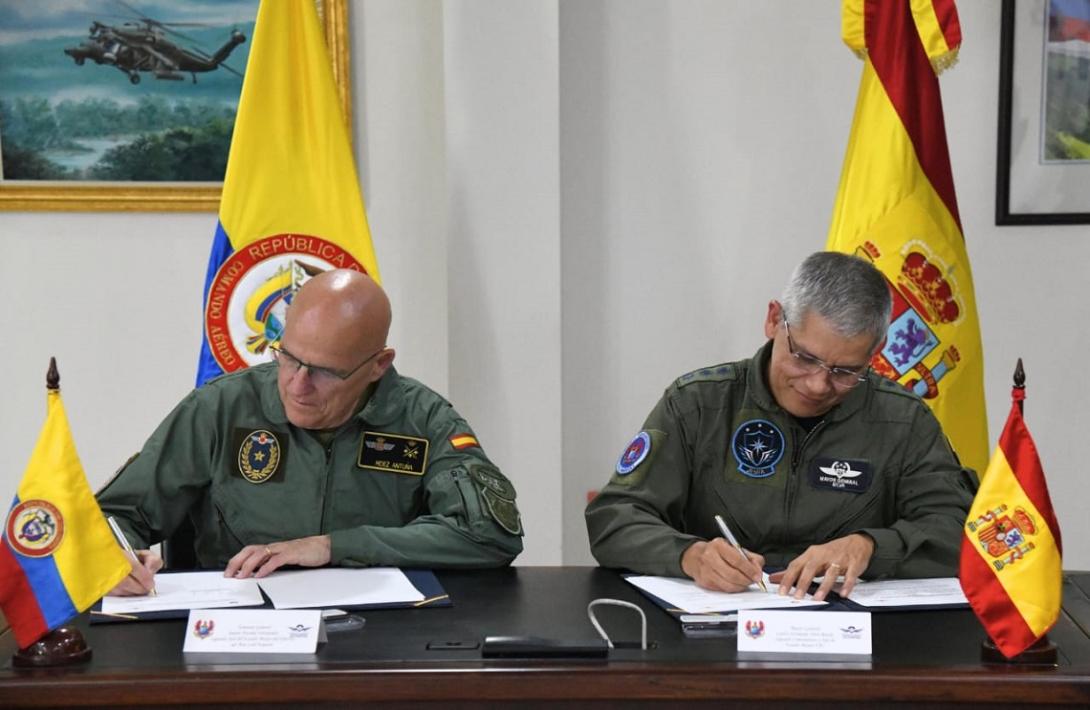With the firm purpose of strengthening strategic alliances and international cooperation ties, as well as interoperability, the Colombian Aerospace Force, FAC, had the opportunity to host and receive the delegation of the Spanish Air and Space Army, within the framework of the Third Meeting of Chiefs of Staffs of Military Forces
The delegation was composed of Major General Carlos Fernando Silva Rueda, Second Commander and Chief of Staff of the Colombian Aerospace Force and Lieutenant General Javier Hernández Antuña, Second Chief of Staff of the Air and Space Army, who approved a new plan of cooperation activities for the next two years, aimed at strengthening training areas, exchange of helicopter pilots and crews, unmanned aircraft, RPA, and participation in air defense and cyberdefense exercises; in the same way, other issues of great relevance for the two institutions.
This is how, during this bilateral meeting held from May 12 to 16, 2025, after six years of its last realization, the ties of closer cooperation expressed by both counterparts were resumed; this was highlighted by General Hernández: “A cooperation from which we can serve both countries to reinforce more ties and learn from each other.”
The meeting was held at the Air Combat Command No. 5 in Rionegro, Antioquia, where the resources of helicopters that carry out aeromedical evacuation, firefighting, humanitarian aid, air attack operations, among other missions, were shown. They in the same way received information about the control and monitoring systems in the cyberspace domain, from experts of the Aerospace Technological Development Center, CETAD.
They in the same way visited the facilities of the Marco Fidel Suárez Military Aviation School, EMAVI, a training center for future Officers of the FAC, where Brigadier General Óscar Mauricio Gómez Muñoz, Director of the EMAVI, welcomed the Spanish delegation and presented the strategic resources that the Colombian Air Force has in the city of Cali, Valle del Cauca.
There, they visited the Aerospace Technologies Research Center, CITAE, where they met the team responsible for satellite projects, highlighting the FAC's commitment to innovation and technological development, and the Space Operations Center (SpOC), where the resources were presented and the operation of FACSAT II, a fundamental strategic component for monitoring the ecosystem and strengthening Colombia's space sovereignty, was highlighted.
On this in particular, the Spanish General referred to the progress of the Colombian Aerospace Force specifying: “You have very clear ideas and very much in line with what we want to do, I have no doubt that, if it is not already, you are the regional space power of this area.”
Additionally, the high Official highlighted regarding the current global context that “it is very important to cooperate with partner and allied countries, such as Colombia, in all the exchange of information in the space domain. Moreover, when we are in a very changing geopolitical moment and we must be prepared to adapt to the changes; it is important the strengthening of key fields such as: air defense, antidron systems, cyberdefense, space command, digital transformation, and giving adequate training to personnel in various specialties, providing the best means and systems for the exercise of their competencies.”
In this way, this international bilateral mechanism contributes to strengthening regional and global security ties, promoting integration of Air Forces that share common values, objectives and challenges, transcending continental borders and positioning the Colombian Aerospace Force as a benchmark in the American continent and a strategic partner for Europe.
Source: International Affairs Office Colombian Air Force / Public Communications Office CATAM - CACOM5 - EMAVI

